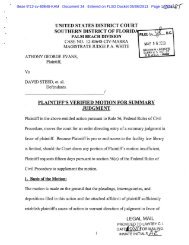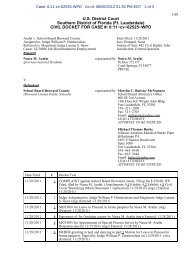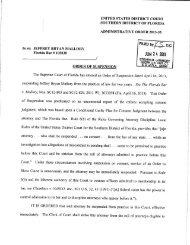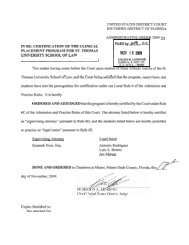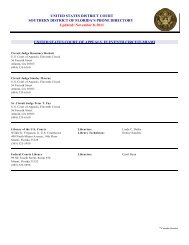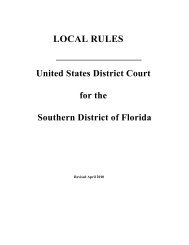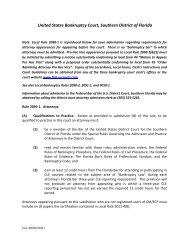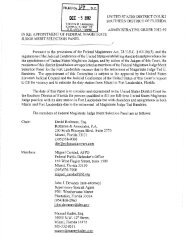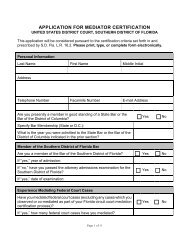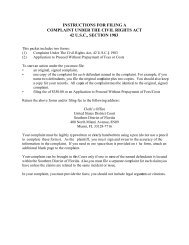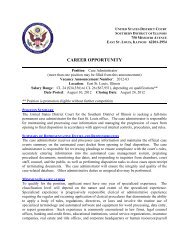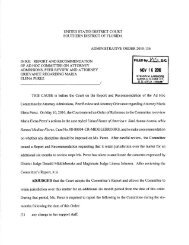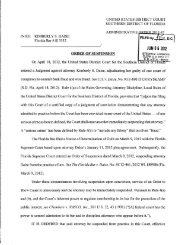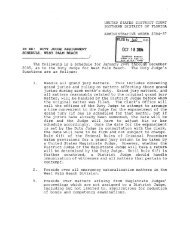JAN j 6 2010 - United States District Court
JAN j 6 2010 - United States District Court
JAN j 6 2010 - United States District Court
You also want an ePaper? Increase the reach of your titles
YUMPU automatically turns print PDFs into web optimized ePapers that Google loves.
class action plaintiff move, within ninety days after the filing of the<br />
complaint, for a determination under Federal Rule of Civil Procedure<br />
23(c)(1) as to whether the action should be maintained as a class action,<br />
to conform to the December 2003 amendment to Federal Rule of Civil<br />
Procedure 23(c)(1)(A), which clarifies that a <strong>Court</strong> may defer the<br />
decision on whether to certify a class if it is prudent to do so.<br />
(<strong>2010</strong>) Amended to conform tabulation to the style used in the federal<br />
rules of procedure.<br />
Rule 24.1 Constitutional Challenge to Act of Congress or State Statute<br />
j>n-(a) Act of Congress. Upon the filing of any action in which the<br />
constitutionality of an Act of Congress affecting the public interest is<br />
challenged, and to which action the <strong>United</strong> <strong>States</strong> or an agency, officer,<br />
or employee thereof is not a party in its or their official capacity,<br />
counsel representing the party who challenges the Act shall forthwith<br />
notify the <strong>Court</strong> of the existence of the constitutional question. The<br />
notice shall contain the full title and number of the action and shall<br />
designate the statute assailed and the grounds upon which it is assailed,<br />
so that the <strong>Court</strong> may comply with its statutory duty to certify the fact<br />
to the Attorney General of the <strong>United</strong> <strong>States</strong> as required by Title 28,<br />
<strong>United</strong> <strong>States</strong> Code, Section 2403. The party challenging<br />
constitutionality shall also so indicate on the pleading or paper which<br />
first does so by stating, immediately following the title of the pleading<br />
or paper, "Claim of Unconstitutionality."<br />
B-r(b) State Statute. Upon the filing of any action in which the<br />
constitutionality of a state statute, charter, ordinance, or franchise is<br />
challenged, counsel shall comply with the notice provisions of Florida<br />
Statutes Section 86.091.<br />
€-r(c) No Waiver. Failure to comply with this Local Rule will not be<br />
grounds for waiving the constitutional issue or for waiving any other<br />
right the party may have. Any notice provided under this rule, or lack<br />
of notice, will not serve as a substitute for, or as a waiver of, any<br />
pleading requirements set forth in the Federal Rules of Civil Procedure<br />
or statutes.<br />
Effective Dec. 1, 1994. Amended effective April 15, 2007.<br />
Authority<br />
(1993) Former Local Rule 9; Model Rule 24.1.<br />
(<strong>2010</strong>) Amended to conform tabulation to the style used in the federal<br />
rules of procedure.<br />
Rule 26.1 Discovery and Discovery Material (Civil)<br />
At (a) Initial Disclosures. Except in categories of proceedings specified<br />
in Federal Rule of Civil Procedure 26 (a) (1) (E) , or to the extent<br />
otherwise stipulated or directed by order, a party must comply with the<br />
disclosure obligations imposed under Federal Rule of Civil Procedure<br />
51



